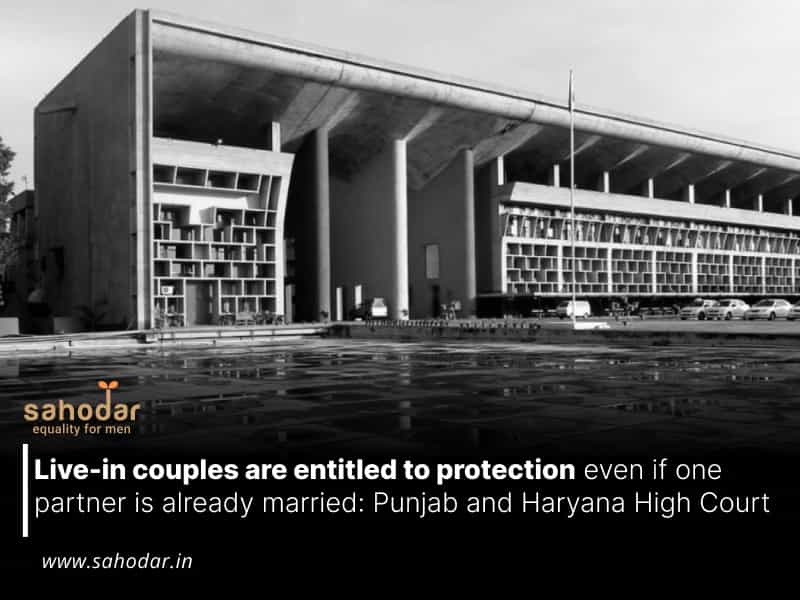The Division Bench gave the ruling while answering a reference made by a single-judge in a protection matter. The reference was made after noticing contradictory judgments of single-judge Benches on the issue.
The Punjab and Haryana High Court recently ruled that live-in couples facing threats are entitled to protection, even if one partner is already married to someone else [Yash Pal and Another vs State of Haryana and Others].
A Division Bench comprising Justice Sureshwar Thakur and Justice Sudeepti Sharma stated that, regardless of the socio-moral implications of such relationships, the couples are endowed with self-autonomy in its various dynamic forms.
“That when one of the live-in partners is married, thus upon tangible threats becoming purveyed to the live-in couple by any of their respective family members or by any moral vigilant, thus therebys the said live-in couple becoming entitled to claim protection, vis-a-vis their relationship becoming as such obstructed,” said the Court.
However, the Bench also noted that if either partner in a live-in relationship has a minor child, the courts can instruct the parent to ensure the child’s care.
“Though, there are remedies under law wherebys the maintenance amounts can become adjudged vis-a-vis the minor children. However, that may not be sufficient to ensure the best nourishing of the personality of a minor child which would rather occur only when the father besides providing maintenance also gives fatherly love, and/or when the mother gives motherly love to the minor child. As such, the live-in couple, one of whom is a major, though may in the manner directed hereinafter seek protection but the granting of protection by Courts of law, thus as parens patriae of minor children, may be conditioned upon the well being, best care takings, and, nourishing of the personality of the minor child being undertaken to be purveyed by the parent concerned,” said the Court.
The Division Bench made this ruling in response to a reference from a single judge, who noticed conflicting decisions by other single-judge Benches on a similar issue.
The key questions were:
- If two people living together ask the Court for protection of their life and liberty, does the Court have to grant it automatically without considering their marital status or other details of the case?
- If the answer is no, in what situations can the Court refuse to provide protection?
While addressing the legal questions, the Court cited several Supreme Court rulings where the right to choice has been recognized as part of the right to life under Article 21 of the Constitution.
In relation to the current issue, the Court also considered the Supreme Court’s decision in Joseph Shine vs. Union of India, which decriminalized adultery in India.
“A more incisive reading of the above extracted paragraphs unfolds, that family, marriage, procreation and sexual orientation are all integral to the dignity of an individual, and, that the right to exercise freedom is an inviolable right inhering in an individual,” the Division Bench said.
Taking into account the Supreme Court’s landmark rulings, the High Court determined that live-in couples are entitled to protection, even if one partner is already married.
However, to prevent an influx of protection cases from such couples before writ courts, the Court emphasized the need to develop alternative mechanisms.
It also noted that the police are already heavily burdened, and assigning officers to protect married couples would further strain the overextended force.
The Court therefore proposed the following measures:
Couples can first approach the District Legal Services Authority, which can assign paralegal volunteers or counselors to speak with the live-in couple and those threatening them.
Additionally, the couples may also seek assistance from the State Human Rights Commission.
“Subsequently, in case the mechanisms as are well considered to be effectively deployed by the above (supra) thus for warding off the threats, as become purveyed to the above genre of live-in couples, thereupon, the live-in couples may not access the writ courts, unless the mechanisms (supra), as become employed are evidently rather a complete failure,” the Court said.
Protection of couples when one of them is a minor
The High Court also examined whether a minor in a live-in relationship with an adult, or minors in such a relationship, can seek legal protection from the courts.
The Court concluded that they cannot, as a minor from any religion is legally unable to enter into a contract.
“If so, he/she has no capacity even to make choices or to express his/her freedom. Contrarily the freedom to make choices by the minors are ably fettered, by the statutes respectively nomenclatured as The Hindu Minority and Guardianship Act, 1956, and, as nomenclatured as Guardians and Wards Act, 1890,” it reasoned.
The Bench also stated that granting protection in such cases would mean the Court is neglecting its duty as parens patriae to the children involved.
“Therefore, the said solemn duty cast upon Courts of law, naturally requires that the minor concerned, rather than being permitted to be a partner in a live-in relationship either with a minor or with an adult, thus his/her custody is required to be ensured to be retrieved to his/her parents, and, natural guardian. However, in the above endeavour if the Court perceives that there would be an imminent threat to the life of the minor, therebys, the Courts are required to be proceeding to recourse the relevant provisions of the Juvenile Justice (Care and Protection of Children) Act, 2015, inasmuch, as directing the minor to till his or her attaining majority, thus staying comfortably at Children Home or at a Nari Niketan, as the case may be,” it added.

